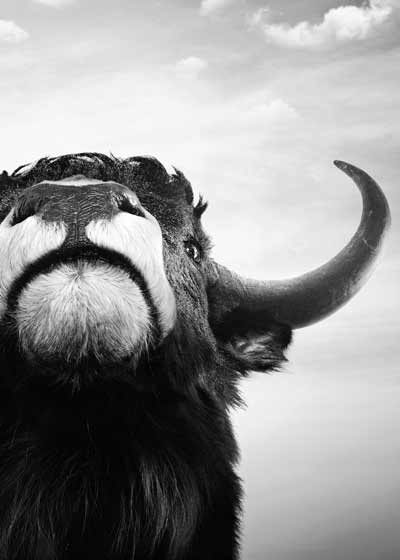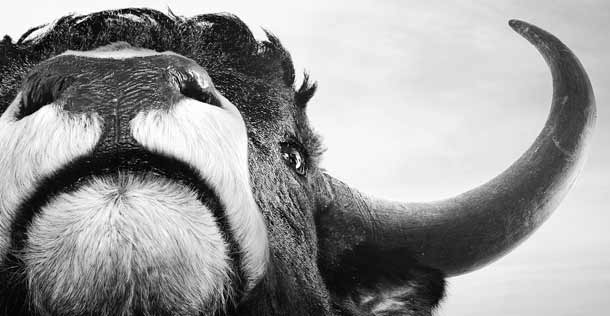
The voice of a bull is not the voice of the cow. The bull growls, a rumble like a train in a tunnel if a train could brood, menace, resent, and pine. He calls, groans, and screams. Pastured away from the herd, a bull who has been a silent lord in their midst bawls his rage and croons his mourning.
Severn Hatch had the farm that you saw on Google Earth as a green eye-patch on a huge gray face. The face was the roofs of 6,000 houses, the farm a round-edged square. From above, it made its statement: I won’t sell. From the roads bordering it, or streets as they were now, it was a kind of theme park. It had a gate and a painted sign SEVERN swinging from a post; it had a grate for keeping cattle in, a barn, a silo, and a pond. It had tractors that could be heard in the mornings, and a bull. Hatch kept his bull long after the herd was gone.
The place and the man were named for a town in North Carolina where Severn Hatch had been born, on his grandparents’ farm where his young parents were waiting out the Depression. After giving birth, his mother had died in her childhood bedroom. Along with both of her parents, who were already known to the bootleggers, his father had fallen by the wayside. But after a few years, the father dragged himself up to Virginia where his own people were. He sent for his son, at 8 already lost to the dazed grandparents and the Carolina schools. Schools did not try to hold onto a child as they do now. He never remarried, and his son never returned to school or married either, living on by himself on the dairy farm built up by the father.
Hatch never sold an acre. He sold his herd a few at a time as the demands of milking got too much for him and as tenants came and went in the little house his father had built and kept up. A dairy that size had to have a tenant or a hired man. Every few years, he went as his father had done and painted the house, working with whoever the tenant was, until he couldn’t find one for the job.
Severn Hatch’s last Holstein bull could get past a fence and did so, as bulls do, with some regularity. When his fields had bordered another herd’s fields — for the change to house lots proceeded in a slow, circling way at first — he was just a visitor. “Lucky to have him stop by and improve the herd,” Hatch would say when a neighbor complained. And in truth the bull came from a good line, and there were still a couple of farmers in the southwestern part of the state who used him as a sire, and that was why Hatch said he kept him, even though eventually he had to drive out some way to get feed and salt blocks.
In the early days, the bull could be brought in from his searching, run back onto his own land by Hatch, a waving stick, and a good dog. Now he was taller than a man and weighed something over a ton. Older and craftier, he was harder to get back in.
Up in his 70s, Hatch could be seen in the Walmart parking lot searching for his bull. He drove all over now instead of walking the fields and roads in a grid that had at one time taken him all day. Nobody outside a few stores knew him, so nobody knew his purpose, though everybody knew the farm, noted on zoning maps as “Severn Farm, Landmark,” and the bull on the highway or growling up a ramp into a battered truck at Walmart was part of county lore. People would get out of the way, but many did not know to be afraid of an animal. Hatch’s clothing did not give him away as the owner, as people of all ages dressed like farmers by then, even in the electronics parks.
At the far end of that parking lot one day, he had a stroke. He was found lying down beside his truck, and when he woke up in the hospital, he started raving about his bull. He got his words back right away, but all he did was call out “Tarnation!” The nurse figured out it was a name. She put it all together. She became the one he talked to in his dread over the next days, when no news of the bull reached them. She was a popular nurse known in the hospital as Kimberly One, because she claimed to be the first person in the U.S. to bear the name.
“Tarnation. I’ve heard of that guy,” she said. “My grandpa farmed here.”
“He’s got to eat,” Hatch said. “Got to have feed. Got to have pills.”
“You worry about your own pills,” Kimberly said. “I’ll find out where he is. Somebody has him, I know.”
“Who would that be?” said Hatch rudely. “Holstein bull is a dangerous animal.”
“Is he mean?”
“Mean he is not. Ah!”
“What? What hurts?”
“Everything,” said Hatch. “How old are you?”
“I’m 56.”
“He’s cute,” she said at the nurse’s station.
“To each his own.”
“No, really, there must be some news of this critter.”
They did find out. The bull had been bumped and thrown by a semi coming off the freeway. By some miracle, he was alive at a large animal vet in the next county, with some stitched-up gashes but no bones broken. Hatch left the hospital in his pressure socks — they had taken his shoes from him — but Kimberly caught up with him in her car and drove him so fast they got stopped for a warning. It was a clear day in March, and the construction sites thinned out as they drove until they were passing between fields starting to show the green of some leaf crop. She said, “What’s that?”
Hatch said, “Couldn’t say,” though he knew every green thing in state soil. Despite the seatbelt she had made him put on, he had himself pressed against the door.
To Kimberly’s eyes, the bull was as big as an elephant in the hoist, gleaming stark black and white against the bandages and tape. At Hatch’s approach, he rolled his eye back and then swung his huge head to see, knocking the vet’s assistant to his knees in the straw. The head was entirely black with long eyelashes shadowing the ball-eye with its wet red corner. Streaks ran down from the eyes as if he had cried.
Getting to his feet, the assistant had had a look at Hatch’s wet socks. He addressed himself to Kimberly, making the sign of writing a bill. “Come on in when you’re done with your visit.”
“He’s beautiful,” Kimberly said. “I bet you’re gonna say don’t touch him.”
“Better not.” Hatch placed his fingers behind the black jaw and bowed his head. “Heart going,” he said after a time.
“Fever.”
“I think he’s just worked up,” said Kimberly. “Because you caught up with him. Everything he’s been through and then you show up. You love this guy.”
Hatch said, “That’s a strong word.”
“Not so strong as all that,” said Kimberly.
Become a Saturday Evening Post member and enjoy unlimited access. Subscribe now



